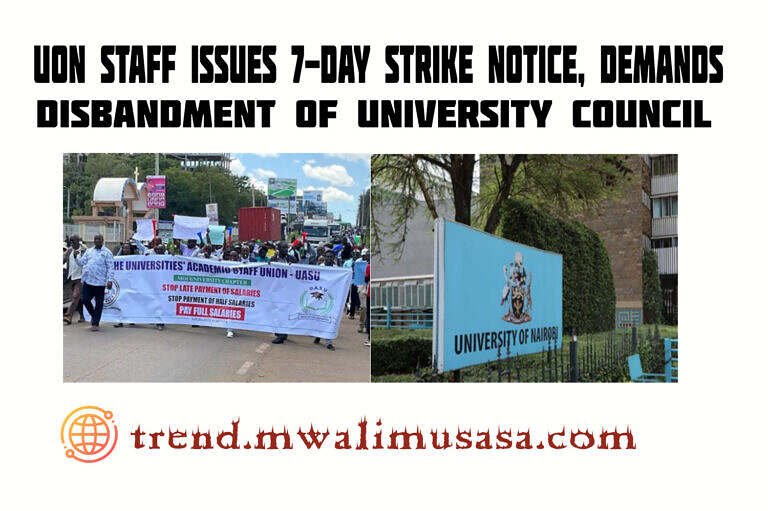
The University of Nairobi (UoN) staff, under the Universities Academic Staff Union (UASU), have issued a seven-day strike notice, demanding the immediate disbandment of the university council over alleged mismanagement and failure to implement the 2021–2025 Collective Bargaining Agreement (CBA).
This standoff highlights deep-seated governance and financial issues at one of Kenya’s premier institutions, with potential consequences for students, faculty, and the wider education sector.
Background of the Dispute
The current crisis stems from a long-standing dispute over salary adjustments and university governance. In November 2024, UASU called off a nationwide lecturers’ strike after reaching a deal with the Ministry of Education. The agreement focused on the implementation of the 2021–2025 CBA, which had been delayed due to funding issues.
Government’s Financial Commitment
As part of the deal, the National Treasury pledged Ksh 9.7 billion to cater to staff salary adjustments. This was to be disbursed in three phases:
- Phase 1 – Ksh 4.3 billion (to cover nine months up to June 2025).
- Phase 2 & 3 – Ksh 2.7 billion each in subsequent allocations.
The agreement was meant to resolve salary discrepancies and improve staff welfare across all public universities, including UoN.
Unfulfilled Promises and Rising Tensions
Despite the government’s assurances, UoN staff claim that the university council has failed to honor the deal, leading to frustration among faculty members.
Their main grievances include:
- Failure to implement salary increments and allowances as per the agreed CBA.
- Alleged financial mismanagement, with concerns that funds meant for staff benefits are being misused.
- Lack of transparency and poor leadership decisions by the university council.
These concerns have led to renewed industrial unrest, with staff demanding the immediate disbandment of the council for its alleged failure to uphold agreements.
Demands and Potential Consequences
UoN staff insist that only new leadership can steer the university in the right direction and ensure the CBA is implemented in full. If their demands are not met within seven days, the union has threatened to go on strike, a move that could:
- Disrupt academic programs, delaying students’ studies.
- Affect research and administrative operations, slowing down university activities.
- Set a precedent for industrial action across other public universities facing similar challenges.
Broader Implications for Higher Education
This dispute reflects a wider crisis in Kenya’s public universities, where chronic underfunding and poor governance continue to threaten academic progress. Other universities facing similar financial and management challenges could follow UoN’s lead, pushing for leadership changes and demanding their own CBAs be honored.
If unresolved, the strike could paralyze one of Kenya’s top institutions, affecting thousands of students and further exposing weaknesses in the country’s higher education funding and governance systems.
What’s Next?
The government and university administration now face pressure to avert the looming strike by engaging in meaningful dialogue with UASU. Failure to act quickly could see an escalation of unrest, not just at UoN, but in other public universities as well.
This developing story underscores the ongoing struggles between university staff, management, and the government over labor rights and financial accountability. The coming days will determine whether a compromise is reached—or if UoN will face yet another major disruption.
Stay tuned for more updates on this and other education-related news.






